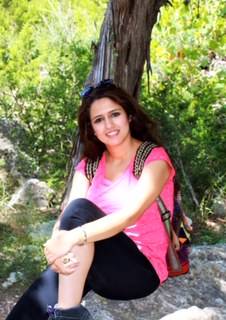Geography graduate student examines perceptions of neighborhood safety
Kelly Youngs | May 13, 2020

As a child growing up in Tehran, Iran, Shadi Maleki quickly became familiar with the impacts of rapid urbanization on her neighborhood and her ability to participate in previously uncomplicated activities like walking to school alone. Later in life, she took on an interest in international relations and worked in environmental education for Italian youth groups with the United Nations Children’s Fund. Her own experiences coupled with those she gained abroad came to play a prominent role in the research she now conducts as a Ph.D. student in Texas State’s Geography Department.
After completing a master’s degree in international relations at the University of Perugia in Italy, Maleki discovered the Sustainability Studies master’s program at Texas State where she earned a second master’s degree in 2016 and is now working toward a doctorate. When she first began her Ph.D. program and was deciding upon a subject for her dissertation, she consulted her advisor, associate professor Dr. Ronald Hagelman, and decided to investigate neighborhood structures and their effect on children and parents’ trust in their neighborhoods. Specifically, she is examining walkability, accessibility to community resources, such as parks, and collective efficacy, which encompasses elements of social interactions. Through Geographical Information Science data and ergo planning maps from the city of Austin, she is examining expert views on the structure of neighborhoods and comparing them to the perspectives of parents who live in those areas. Eventually, she plans to map any discrepancies to highlight areas in which experts’ ideas of safe neighborhoods do not align with those who actually reside in them.
Maleki hopes that her research will help provide insight to both the city of Austin and experts in other communities. Her wish is to draw attention to the fact that some problems cannot be solved by a singular method, and she wants to encourage experts to be open to taking multiple approaches. Ultimately, Maleki wants to see her research create a connection between academia and the community. Since she has started, she has formed relationships with parent teacher associations in Austin. Her goal is to bridge the disconnect that can sometimes happen with academic research and encourage people to talk about their neighborhoods and what they want from them.
Maleki recommends other researchers pursue topics about which they are passionate. While it can get tedious at times, she says it is very rewarding to see the project you care about come to fruition and it is even more satisfying to have it affect the community in a positive way.
Share this article
For more information, contact University Communications:Jayme Blaschke, 512-245-2555 Sandy Pantlik, 512-245-2922 |